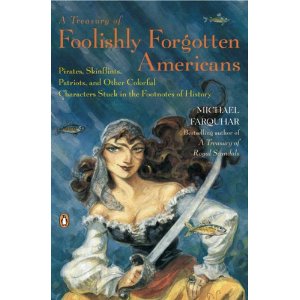Review: Farquhar, Foolishly Forgotten Americans October 30, 2010
Author: Beach Combing | in : Contemporary, Modern , trackbackA small note: today’s the day that Beachcombing’s first Bizarre Bibliography goes up – Mrs B has taken little Miss B to music therapy (truly…) so Beach has a couple of hours to burn. This bibliography should appear on the horizontal tabs above before evening. It will be short. At first. Any contributions or links to reviews would be gladly taken into account: drbeachcombing AT yahoo DOT com
Now the main event…
Farquhar, Michael’s A Treasury of Foolishly Forgotten Americans: Pirates, Skinflints and Other Colorful Characters Stuck in the Footnotes of History (Penguin 2008), got Beachcombing all rather existential. What, Beachcombing began to ask himself, is bizarre history? What makes a person or an event strange? Beachcombing would normally adapt Housman’s definition of poetry: ‘I could no more define [bizarreness] than a terrier can define a rat’.
However, if pushed to go beyond Housman’s instinctual imperative he would probably mutter something about ‘seeming peculiar’.
‘Peculiar’ to the addled mind of Beachcombing, the modern world or to contemporaries, the attentive reader might ask? Beachcombing blanches and is not sure: preferably all three. He certainly must admit that for the purposes of this blog his own addled mind leads the pack.
Beachcombing is aware though that there are other ways of cutting the pack and the author Michael Farquhar has come up with one. He demands three conditions for inclusion in his latest book: ‘American’, ‘forgotten’ and ‘colourful’. Of course, these three adjectives need not necessarily go together. But there is something of the puritan in American text-book writers that decimates the weirdos from the ranks of fame.
Let Beachcombing pontificate/elaborate. If you rescue a Dane from undeserved historical obscurity it will be probably because he or she did not say or do what Danish text-book writers believed Danes should have been doing or saying at that date. Rescue a similarly obscure American, however, and there is a damn good chance that it was because he or she was a cross-dressing pirate who was just a little too ‘vivid’ (shall we say) for the ten-year-old Lindseys and Erics and Briannes passing through the state school system. Forget Lies My Teachers Told Me. It should be Stories My Teacher Neglected to Tell Me…
There is no question that the Americans that Farquhar has herded together are unusual human fauna. However, and this is more the result of the American national character than the author’s cherrypicking, they are not gentle, eccentric and ultimately harmless English Dukes or French Cardinals – the mockingbirds of European history. No, they are curious sociopaths, who you will warm to depending on any coincidence between your and their often frightening value systems.
Beachcombing found himself wondering while reading whether the key for a European trying to understand America is sincerity. Certainly, the British long since got rid of that particular virtue and it is one that Beachcombing has to flail around for, like a serial killer looking for pity in the dust.
The reader is not charmed then but entertained and instructed by the lives of these ‘footnotes’ and the entertainment is all down to the good, clean writing of our author who lacks their certainties and keeps a useful but never haughty detachment. He wrote for the Washington Post, you know.
Now a list of these unusual folks and Farquar’s chapter headings for search engines to pick over: ‘John Billington: Mayflower Murderer’; ‘Mary Dyer: Quaker Martyr’; ‘Anne Bonny: Pirate of the Caribbean’; ‘Mary Jemison: The White Woman of the Genesee’; ‘William Dawes: the Other Midnight Rider’; ‘James T. Callender: Muckracker for the First Amendment’; ‘Elizabeth Patterson Bonaparte: Royal American’; ‘Stephen Pleasonton: The Clerk Who Saved the Constitution (and the Declaration of Independence, Too)’; ‘Richard Mentor Johnson: the Veep Who Killed Tecumseh’; ‘Zilpha Elaw: An Unlikely Evangelist’; ‘Edwin Forrest: American Idol’; ‘Rose O’Neale Greenhow: A Spy of Grand Dame Proportions’; ‘Clement Vallandigham: Copperhead’; ‘Mary Surratt: The Mother of Conspirators?’; ‘Tunis Campbell: Pillar of Reconstruction’; ‘Sarah Winnemucca: Paiute Princess’; ‘Alexander ‘Boss’ Shepherd: The Man Who Made Washington Worthy of the Nation’; ‘Isaac C. Parker: The Hanging Judge’; ‘Hetty Green: The Witch of Wall Street’; ‘Oliver Curtis Perry: Outlaw of the East’; ‘Anna Jarvis: The Mother of Mother’s Day’; ‘William J. Burns: American’s Sherlock Holmes’; ‘Gaston B. Means: American Scoundrel’; ‘Louise Arner Boyd: The Socialite Who Conquered the Arctic Wilderness’; ‘Beulah Louise Henry: Lady Edison’; Guy Gabaldon: the Pied Piper of Saipan’; ‘Elizabeth Bentley: Red Spy Queen’; ‘Dick Fosbury: Father of the Flop’. There is also a select bibliography of six pages.
Beachcombing recognised five names before he began. His favourite was probably Hetty Green though Guy Gabaldon brought tears to his eyes and Louise Arner Boyd lived the best life – how Beachcombing would have loved to go to bed with her. Worryingly, looking back over the list now, he can no longer remember who four were. Let’s put it down to declining cognitive functions. Or perhaps – the horror! – these four really deserved to be forgotten…



